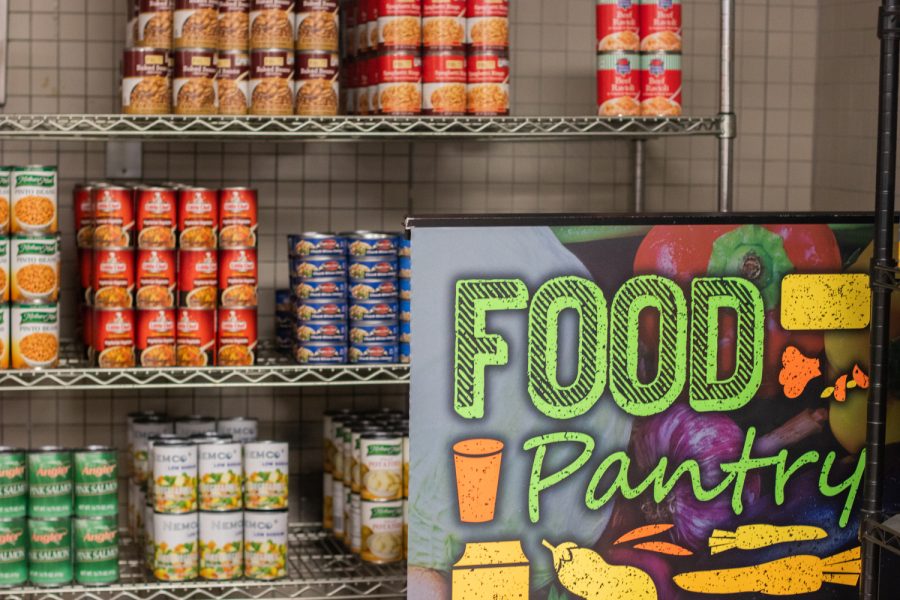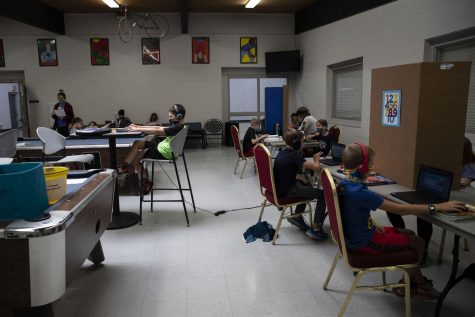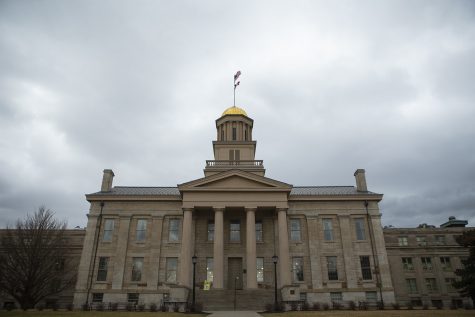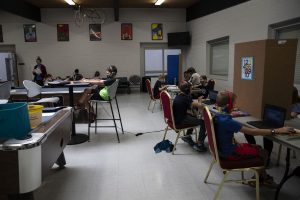Iowa City food pantries adjust services to combat food insecurity during COVID-19
Table to Table and the Food Pantry at Iowa have both adjusted their operations to better serve the Iowa City community during a time where food insecurity is increasing at record levels.
The Food Pantry at Iowa, located in the Iowa Memorial Union, serves the Hawkeye community one meal at a time. Wednesday was distribution day, so the pantry will restock before the next distribution.
October 1, 2020
Families in Iowa City and across the U.S. are facing economic instability stemming from COVID-19, and many local nonprofits are looking to combat rising food insecurities.
The Hamilton Project reports that since the COVID-19 pandemic began, food insecurity is prevalent now more than ever and increasing at record levels.
Field to Family is a nonprofit organization that works to provide a community food system that positively impacts the economy, environment, and health with locally grown and produced food to residents in the Iowa City and Cedar Rapids area.
Michelle Kenyon, director of Field to Family, said families in Iowa are part of the growing number of people who do not consume the necessary amount of fresh produce.
“National reports [have] showed that Iowans were on the lower end in the country of adults and children who receive the proper amount of fruits and vegetables every day,” Kenyon said.
This was surprising, she said, as Iowa is known for its rich soil and integral agriculture industry.
“It was embarrassing, because we have such fertile soil here,” Kenyon said. “We have a lot of people who are farming, sure, but we also have a lot of farmers that are looking for markets and struggle.”
The director said she believes the demand for fresh, locally grown produce has increased since COVID-19 began, especially in Iowa City.
“It took COVID-19, I think, for a lot of citizens around here and of course in the country, too, to really see more of the value for local foods,” she said “So, the demand has risen.”
Table to Table, a food rescue-distribution organization in Iowa City, has been serving the Iowa City community and broader Johnson County area for more than 20 years.
Anne Langebartels, Table to Table communications and development coordinator, said there has been an increase in food insecurity within Johnson County.
As of August, the Iowa Workforce Development reported that Johnson County is facing an unemployment rate of 6 percent, compared to last August with an unemployment rate of 2.2 percent.
Infographic by Kelsey Harrell/The Daily Iowan
“There’s always food insecurity,” Langebartels said. “[COVID-19] really made [this issue] more critical for many families in our community. Many families who weren’t experiencing food insecurity are now experiencing it because of the pandemic’s effects.”.
She said Table to Table has adjusted their services to better serve the community through the pandemic.
“We’ve also recently started a couple new initiatives this summer to collect more food donations, and we’re really trying to emphasize collecting fresh food donations,” she said. “Produce especially, can be really difficult for people in need, that are food insecure, to access – especially that fresh, locally grown produce, that’s really high quality.”
Langebartels added that these recent efforts have helped provide local food resources to approximately 12,000 Johnson County residents that are currently experiencing food insecurity.
RELATED: University of Iowa Food Pantry sees increased clientele during pandemic
Similar to Table to Table, the Food Pantry at Iowa student organization adjusted their operation services because of increased food insecurity within the community caused by COVID-19.
Executive Director Charlotte Lenkaitis said the food pantry recently partnered with the UI Department of Housing and Dining, where they repurpose pre-packaged meals prepared for UI students in isolation or quarantine housing.
“All the students that are in isolation or quarantine, [the dining department] has to make pre-packaged meals for them,” Lenkaitis said. “Sometimes they don’t know how many students they have to provide food for, so they have been giving us leftover food, which has been really great.”
Lenkaitis said that over the summer, the food pantry distributed 18,000 pounds of food and saw 816 total client visits – most of whom were UI graduate students.
She said the food pantry has distributed 11,539.5 pounds of food so far this semester, in comparison to the 2,973 pounds of food distributed at this time last fall.
Along with this, the food pantry has had 593 total visits from clients since the fall semester started, while at this time last year, the pantry had a total of 215 client visits.
She added that the Food Pantry at Iowa is not allowed to accept any outside donations from community members or UI faculty and staff, and has to operate under UI COVID-19 safety guidelines.
“Since [COVID-19] started, we have not been allowed to accept donations,” said Lenkaitis. “We just submitted a proposal again, to accept donations.”
Lenkaitis said not being able to form their own rules and accept donations is difficult, as the food pantry serves not only the UI, but also the greater Iowa City community, something she said she feels diminishes the productivity and impact of the pantry.
The pantry hopes to evolve within future years, she said, in order to help provide clients with resources that will better impact them and provide a sense of security.
“We see the service we provide currently as an emergency food need, and so our hope is that we can provide for individuals who are experiencing unexpected changes in employment, or income, or things like that,” Lenkaitis said. “We want to be there to provide that support, but our hope in the long run is that individuals that are still facing food insecurity or basic need insecurity can be connected to resources that are going to be more sustainable for them.”




















